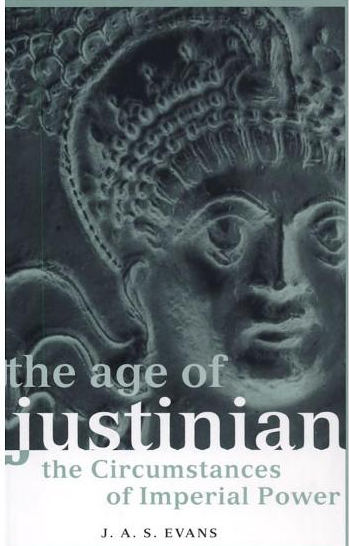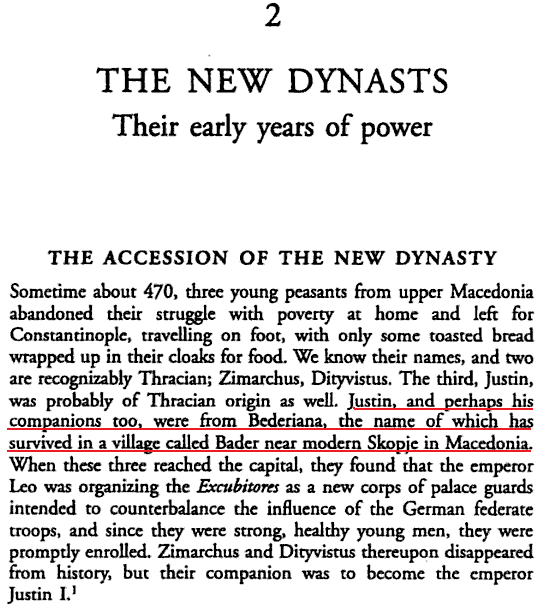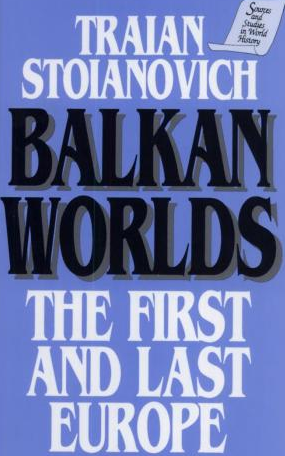Village of Bader, Tauresium, Justinian, + more

page 96

About Tauresium
Tauresium, the birthplace Justinian I (527-565), is mentioned by ancient author Prokopius in his composition �De aedificiis� � �For buildings�.
In his composition, Prokopius declared:
�� Somewhere in the area of European Dardanians, who live behind Epidamnian border, close to castle Baderiana (today, village Bader), was found village Tavrisi (today, Taor). Here was born king Justinian, founder of world kingdom. Surrounding this village with square walls and building tower on each corner, he created four corner castles and named it Tetrapirgus. Here he build nice city and named it Justiniana Prima, on this way he wants to show his gratitude to parenthood��
The site of archeological locality �Gradishte� � v. Taor is 20 km southeast from Skopje. First time, it is discovered hundred and more years ago, from English traveler Arthur Evans, who recognized lost city as Justiniana Prima, where ancient Skupi was located, and village Taor as Tauresium, birthplace of king Justinian I. In historical chronology this locality is related with big imperator Justinian I, mostly because of the quoted data from his biographer Procopius. According to historian Procopius, Justinian I was born in the place named Tauresium, near castle Baderiana. This settlement was destroyed in the big earthquake in 518 year; the epicenter was in present Skopje and beside other cities, ancient colonia of Skupi suffered lost. Justinian I renovate and build up again this city; with this showing gratitude to its birthplace. Close to this place, he builds wonderful and fascinating city of his archiepiscopy, Justiniana Prima.
The excavations showed that in Taor really exist castle from IV century with four towers (tetrapirgia). As Procopius noticed, 6 km east from Taor, near village Bader is settled castle with oddments from IV-VI century. Maybe its real name was Baderiana, which Procopius indicates it as nearest landmark. It is important to declare that names of villages Taor and Bader has before Slavic heritage, which indicates, the possibility this names are deductive from Tauresium and Baderiana. In 2000 year started a systematic excavation performed from Museum of the city of Skopje and leader of excavation was archeologist Kiro Ristov.
First explorations on the field recorded artifacts from early bronze century (which are sporadically and without parallel cultural layer as context). Later was discovered part from the bulwark which surrounded the settlement. The focus, for now, is on remains on two public buildings, from which second one is more interesting, because researchers assume this is atrium. The atrium induce the idea that here we should expect existence of bigger public building. This shows that in the period of late antique, from IV-VI century and later, the population in this area had active social life. For this testify the big number of coins, jewelry, ceramic plates, glass objects for everyday use, armor remains, tools, weapons and other artifacts.

page 96

About Tauresium
Tauresium, the birthplace Justinian I (527-565), is mentioned by ancient author Prokopius in his composition �De aedificiis� � �For buildings�.
In his composition, Prokopius declared:
�� Somewhere in the area of European Dardanians, who live behind Epidamnian border, close to castle Baderiana (today, village Bader), was found village Tavrisi (today, Taor). Here was born king Justinian, founder of world kingdom. Surrounding this village with square walls and building tower on each corner, he created four corner castles and named it Tetrapirgus. Here he build nice city and named it Justiniana Prima, on this way he wants to show his gratitude to parenthood��
The site of archeological locality �Gradishte� � v. Taor is 20 km southeast from Skopje. First time, it is discovered hundred and more years ago, from English traveler Arthur Evans, who recognized lost city as Justiniana Prima, where ancient Skupi was located, and village Taor as Tauresium, birthplace of king Justinian I. In historical chronology this locality is related with big imperator Justinian I, mostly because of the quoted data from his biographer Procopius. According to historian Procopius, Justinian I was born in the place named Tauresium, near castle Baderiana. This settlement was destroyed in the big earthquake in 518 year; the epicenter was in present Skopje and beside other cities, ancient colonia of Skupi suffered lost. Justinian I renovate and build up again this city; with this showing gratitude to its birthplace. Close to this place, he builds wonderful and fascinating city of his archiepiscopy, Justiniana Prima.
The excavations showed that in Taor really exist castle from IV century with four towers (tetrapirgia). As Procopius noticed, 6 km east from Taor, near village Bader is settled castle with oddments from IV-VI century. Maybe its real name was Baderiana, which Procopius indicates it as nearest landmark. It is important to declare that names of villages Taor and Bader has before Slavic heritage, which indicates, the possibility this names are deductive from Tauresium and Baderiana. In 2000 year started a systematic excavation performed from Museum of the city of Skopje and leader of excavation was archeologist Kiro Ristov.
First explorations on the field recorded artifacts from early bronze century (which are sporadically and without parallel cultural layer as context). Later was discovered part from the bulwark which surrounded the settlement. The focus, for now, is on remains on two public buildings, from which second one is more interesting, because researchers assume this is atrium. The atrium induce the idea that here we should expect existence of bigger public building. This shows that in the period of late antique, from IV-VI century and later, the population in this area had active social life. For this testify the big number of coins, jewelry, ceramic plates, glass objects for everyday use, armor remains, tools, weapons and other artifacts.







Comment